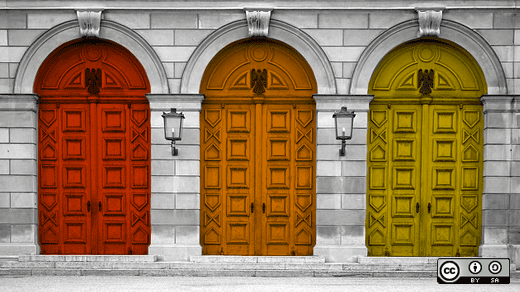Could open organization principles successfully apply to entire societies?
That's the question I asked as I read the book Open: The Story of Human Progress by Johan Norberg, which aims to examine the relative success of "open societies" throughout global history.
In this review—the first article in an extended discussion of the work from Open Organization community members—I will summarize more precisely what Norberg means when he uses the term "open" and offer an initial assessment of his arguments. Ultimately, however, our discussion will explore more expansive themes, like:
- the importance of open societies,
- what the future could (or should) look like in a more open world, and
- how these principles impact our collective understanding of how organizations operate in service of "the greater good"
Four dimensions of openness
Essentially, Norberg is looking at four dimensions of "open," which he calls:
- "open exchange" (global goods and service flows across borders),
- "open doors" (global movement of people),
- "open minds" (global receptivity to new and different ideas), and
- "open societies" (how cultures should be governed to benefit from the above three)
Let me discuss each one more extensively.
Open exchange
Norberg uses the phrase "open exchange" to refer to the movement of goods and services not just across borders but within them as well. Simply put, he believes that people across the world prosper when trade increases, because increased trade leads to increased cooperation and sharing.
His argument goes like this: when a nation (and to be sure, Norberg aims his advice at contemporary nation-states) allows and includes foreign goods into their market, in general they also gain expertise, skills, and knowledge, too. Surplus goods/services that one may have should be sold anywhere they might provide value and add benefit for someone else—and those benefits might include, for example, favors, ideas, knowledge, not just goods and services themselves. Reciprocity and relatively equal exchange is for Norberg an unavoidable aspect of human nature, as it builds binding relationships that promote more generosity. Generosity in turn promotes more trade, creating a cycle of prosperity for all involved.
This view holds for organizations working with uncommon trade partners as well. Greater organizational specificity leads to the need for more cooperation and sharing, which leads to even more specialization. So here we can see a link between open societies and open organizations regarding trade issues.
Open doors
For Norberg, "open doors" refers to people's ability to move across national borders, for one reason or another. He believes the gradual inclusion of foreigners into a society leads to more novel and productive interactions, which leads to greater innovation, more ideas, and more rapid discoveries. For a society to be productive, it must get the right talent performing the right tasks. Norberg argues that there should be no barriers to that match-up, and people should be mobile, even across borders, so they can achieve it.
Norberg outlines how, throughout history, diverse groups of people solve problems more effectively—even if they create more friction as they do so, as members have their assumptions questioned. This kind of open environment must be promoted, supported, and managed, however, in order to avoid groupthink, the predominance of voices that are merely the loudest, and the outsized influence of niche interests.
Critical to the success of "open doors" are recognition, respect, understanding, acceptance, and inclusivity toward others. Norberg discusses the importance of these qualities, citing the World Values Survey, which measures some of them. Done well, open doors can allow societies to cross-fertilize, borrowing ideas and technology from each other and multiplying that which works best.
We could say that's equally true for an organization wanting to develop a new product or market, too.
Open minds
"Open economies stimulate open-mindedness," Norberg writes. For him, "open minds" are those receptive to thoughts and belief systems that may seem different, foreign, or alien to them—those that both offer and receive different perspectives. Open minds, Norberg claims, lead to more rapid progress.
Open minds flourish when given the space to encounter new ideas and explore them freely—rather than, say, simply accept the given dogma of an age. According to Norberg, people from a wide range of disciplines, specialties, and skills coming together and sharing their perspectives stimulates growth and progress. But this is only possible when they exist in an environment where they feel free to question the status quo and possibly overturn long-standing beliefs. Barriers to creating those environments certainly exist (in fact, the entire second half of Norberg's book offers a deeper analysis of them).
Of course this is true in organizations as well. The more people (and the more different people) who look at a problem, the better. This not only leads to faster solutions but helps overcome anyone's individual biases. Serendipitous solutions to problems can seemingly come out of nowhere more often, as there will be better and more peer review of strongly held positions. And yet differences create friction, so standards of protocol and behavior are required to ensure progress.
For Norberg, the world benefits when scientists, philosophers, industrialists, and craftspeople can influence one another's thinking (and are receptive to having their thinking changed!). The same is true in open organizations when people with different roles and functions can work together and enrich one another's thinking. More experiments and greater collaboration among disciplines lead to richer discoveries.
Open societies
Combining open minds, open exchange, and open doors can lead to fully open societies globally, Norberg argues, and "the result is discoveries and achievements." Governments, he asserts, should work to foster those kinds of societies across the globe. In this way, societies can tap into the greatest talent from the entire global community.
According to Norberg, more inclusive societies based on these open policies can lead to material gains for people—fewer hours working, the ability to launch careers earlier (or retire later, if they choose), longer lives in general, and more. This is not to mention reductions in extreme poverty, child and maternal mortality, and illiteracy globally. On top of that, for Norberg global cultural collaboration leads to better utilization of ecological, natural, and environmental resources. All this can be achieved through specific specialties that advance societies at an exponential rate though openness.
Open makes a historical argument. Norberg believes that throughout the ages it was not defenders of tradition that prospered most. Instead, those thinkers, engineers, and philosophers that challenged the status quo made the greatest contribution to global prosperity. Those figures benefitted from societies that were more open to improvements because they governed their own experiments, fostered rapid feedback loops, and built systems that quickly self-correct during setbacks.
Yet like any history, Norberg's is partial and selective, presenting isolated cases and examples. And some of those include even the most brutal empires, whose violence Norberg tends to overlook. In future parts of this review, we'll dive more deeply into various aspects of Norberg's analysis—and discuss its implications for thinking about a more open future.






1 Comment